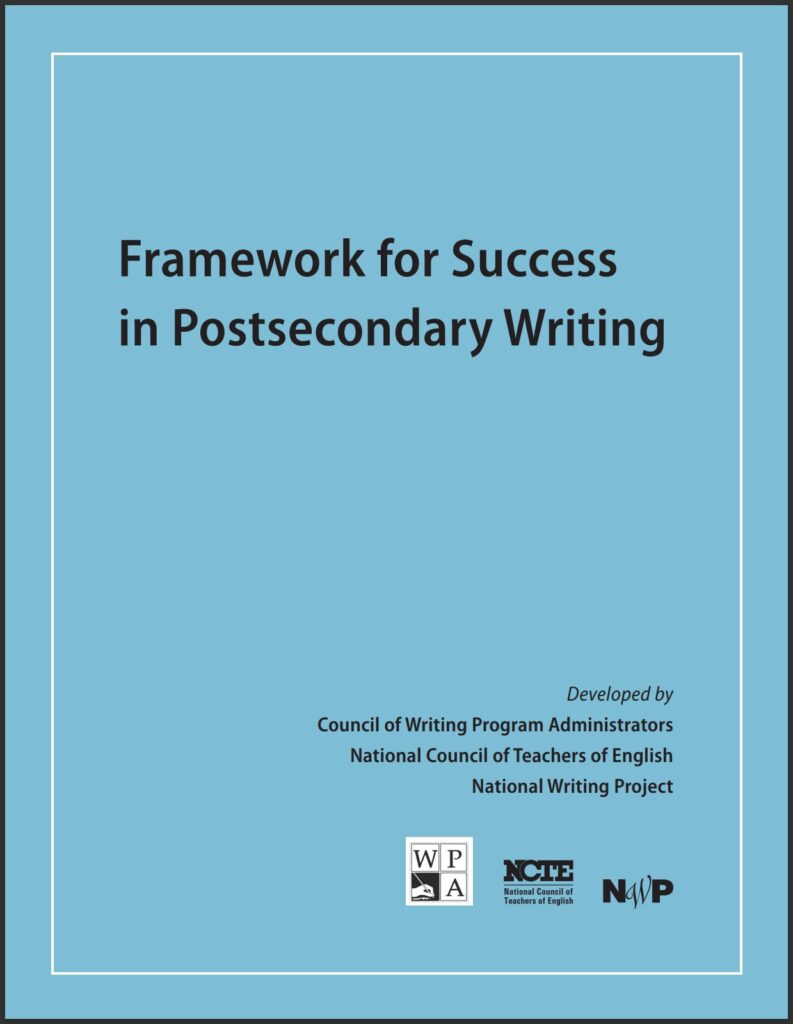Summary:
Developed collaboratively among representatives from the Council of Writing Program Administrators, the National Council of Teachers of English, and the National Writing Project, Framework for Success in Postsecondary Writing describes the rhetorical and twenty-first-century skills that are critical for college success based on current research in writing and writing pedagogy. This short introduction includes a list of the habits of mind identified as essential for success in college writing and includes a link to the complete Framework which is of particular interest to study groups and teacher leaders planning and facilitating professional development in the teaching of writing.The concept of “college readiness” is increasingly important in discussions about students’ preparation for postsecondary education.
This Framework describes the rhetorical and twenty-first-century skills as well as habits of mind and experiences that are critical for college success.
Based in current research in writing and writing pedagogy, the Framework was written and reviewed by two- and four-year college and high school writing faculty nationwide and is endorsed by the Council of Writing Program Administrators, the National Council of Teachers of English, and the National Writing Project.
Habits of Mind
The Framework identifies eight habits of mind essential for success in college writing—ways of approaching learning that are both intellectual and practical and will support students’ success in a variety of fields and disciplines:
- Curiosity: the desire to know more about the world.
- Openness: the willingness to consider new ways of being and thinking in the world.
- Engagement: a sense of investment and involvement in learning.
- Creativity: the ability to use novel approaches for generating, investigating, and representing ideas.
- Persistence: the ability to sustain interest in and attention to short- and long-term projects.
- Responsibility: the ability to take ownership of one’s actions and understand the consequences of those actions for oneself and others.
- Flexibility: the ability to adapt to situations, expectations, or demands.
- Metacognition: the ability to reflect on one’s own thinking as well as on the individual and cultural processes used to structure knowledge.
Writing, Reading, and Critical Analysis
The Framework then explains how teachers can foster these habits of mind through writing, reading, and critical analysis experiences. These experiences aim to develop the following aptitudes:
- Rhetorical knowledge: the ability to analyze and act on understandings of audiences, purposes, and contexts in creating and comprehending texts;
- Critical thinking: the ability to analyze a situation or text, and make thoughtful decisions based on that analysis, through writing, reading, and research;
- Writing processes: multiple strategies to approach and undertake writing and research;
- Knowledge of conventions: the formal and informal guidelines that define what is considered to be correct and appropriate, or incorrect and inappropriate, in a piece of writing; and
- Abilities to compose in multiple environments: from using traditional pen and paper to electronic technologies.
Download “Framework for Success in Postsecondary Writing” (PDF) →


